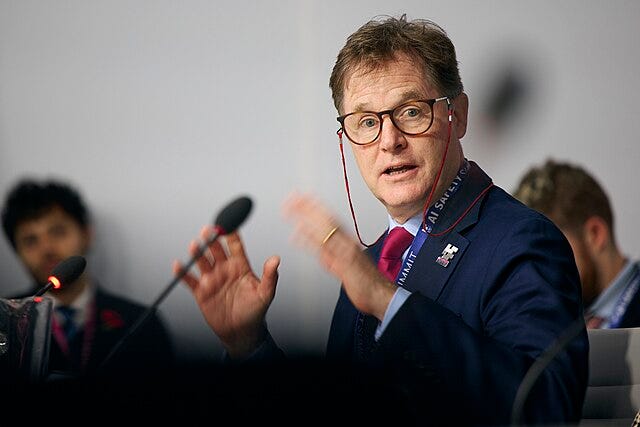What is Nick Clegg up to?
The former deputy PM nailed his second act. The third may prove harder.
I try to make it my business not to question other people’s life choices. This is, in large part, an act of self-preservation. I mean, look at me. A beagle-owning, 30-something newsletter writer. Carrie Bradshaw but with fewer shoes and not a single invitation to a gallery opening.
Still, with parliament in recess and the United States led by a mad grifter, there is an opportunity to ponder what on earth Britain’s former deputy prime minister is up to. The short answer is that he has a book to shill for. How to Save the Internet by Nick Clegg is released in September, just in time for Liberal Democrat conference. Mothers, lock up your fiscally liberal, socially awkward sons.
Speaking at the Charleston Festival, Clegg suggested that legislation to ensure that artists’ permission was sought before their work could be gobbled up by large language models would “kill” the UK’s artificial intelligence (AI) industry. According to The Times, the former Meta president of global affairs warned:
I just don’t know how you go around, asking everyone first. I just don’t see how that would work. And by the way if you did it in Britain and no one else did it, you would basically kill the AI industry in this country overnight.
In fairness to Clegg, he is only saying the quiet part out loud. AI models do rely on vast amounts of data and there is something of a prisoner’s dilemma to it. If every jurisdiction other than the UK allows copyrighted information to be consumed, that would presumably have a potentially wide-ranging impact. Which is why I’m not particularly interested in it.
My real fascination is: what does Clegg want? The answer cannot be money. The man has amassed generational wealth following his time at Meta, earning tens of millions through the acquisition and sale of shares in the company. And he has done so rather more successfully than his former coalition partner.
Could it be an elder statesman role? Clegg has called for the Lib Dems to be prepared to enter government once again, in the event of a hung parliament. But the party has already gotten over its punishment for entering the coalition. Indeed, its present leader, Ed Davey1, served as energy secretary in that administration, though no one normal remembers this, and instead he is known as that nice man who sometimes looks silly and cares for his disabled son.
What about becoming a liberal firebrand? Speaking at Charleston, Clegg also criticised police for being “too censorious” of online speech. The problem here is that the British public is rather authoritarian on this sort of thing. There’s usually plurality support for banning things or new lockdowns. Even the Lib Dems appear to be turning their backs on liberalism, what with their recent policy on fining people who play loud music on public transport.
Clegg has enjoyed a remarkable second act since leaving British politics. He earned the trust of Meta founder Mark Zuckerberg and rose to the board of the tech giant. This is not failing upwards, and nor is it dumb luck — reaching the top of two vastly different professions takes skill, charm, and strategic clarity.
Yet for all that, it is unclear what he stands for now, beyond preserving the wild west advantages of the tech industry. Clegg has not been a politician for almost a decade. If anything, he resembles a ghost of centrism’s past — articulate, accomplished, and oddly adrift. He is not the right messenger for whatever he is selling.
Davey is also a year Clegg’s senior, which reminds me of the Harold Wilson line when James Callaghan took over from him in 1976, that he was making way “for an older man”.



